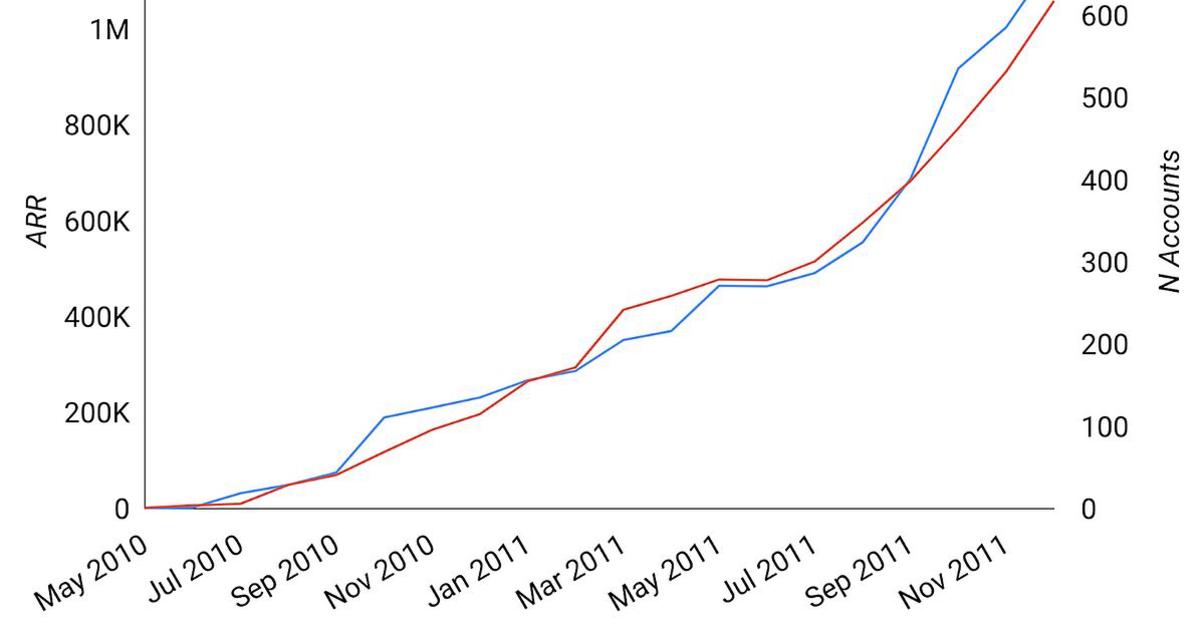A Smart Bear: On Strategy
-
 The roadmap to Product/Market Fit (PMF)… maybeThis eight-step process brought WP Engine from an idea to a Unicorn. While there are other roads to Product/Market Fit, consider copying some of these ideas. —December 2023 | 6,500 words.
The roadmap to Product/Market Fit (PMF)… maybeThis eight-step process brought WP Engine from an idea to a Unicorn. While there are other roads to Product/Market Fit, consider copying some of these ideas. —December 2023 | 6,500 words. -
 Excuse me, is there a problem?Many startups fail despite identifying a real problem and building a product that solves that problem. This explains why, so you can avoid their fate. —April 2023 | 6,800 words.
Excuse me, is there a problem?Many startups fail despite identifying a real problem and building a product that solves that problem. This explains why, so you can avoid their fate. —April 2023 | 6,800 words. -
 Navigating the unpredictability of everythingWe dramatically, repeatedly fail to predict the future. Does that mean “strategy” is senseless? No, it means you need these techniques to navigate a volatile world. —March 2023 | 4,900 words.
Navigating the unpredictability of everythingWe dramatically, repeatedly fail to predict the future. Does that mean “strategy” is senseless? No, it means you need these techniques to navigate a volatile world. —March 2023 | 4,900 words. -
 Using the Needs Stack for competitive strategyThis simple method positions your product to be more valuable, especially against competitors who aim to disrupt you, or you them. —June 2023 | 3,800 words.
Using the Needs Stack for competitive strategyThis simple method positions your product to be more valuable, especially against competitors who aim to disrupt you, or you them. —June 2023 | 3,800 words. -
 Willingness-to-pay: Creating permanent competitive advantage for the right reasonsThis fresh take on “Willingness-to-Pay” analyzes three types of customer motivation, leading to superior strategies for growth that also better the world. —May 2023 | 4,000 words.
Willingness-to-pay: Creating permanent competitive advantage for the right reasonsThis fresh take on “Willingness-to-Pay” analyzes three types of customer motivation, leading to superior strategies for growth that also better the world. —May 2023 | 4,000 words. -
 How startups beat incumbentsA startup can beat a large, successful incumbent, if it does things the incumbent can not or will not do. Here are those things. —February 2024 | 4,800 words.
How startups beat incumbentsA startup can beat a large, successful incumbent, if it does things the incumbent can not or will not do. Here are those things. —February 2024 | 4,800 words. -
 Avoid blundering: 80% of a winning strategyWhy do startups typically fail? It turns out that “avoiding those things” is already a plan for success. —March 2024 | 4,000 words.
Avoid blundering: 80% of a winning strategyWhy do startups typically fail? It turns out that “avoiding those things” is already a plan for success. —March 2024 | 4,000 words. -
 AI startups require new strategies: This time it’s actually differentThe typical dynamics between startups and incumbents do not apply in AI as they did in previous technology revolutions like mobile and the Internet. Ignore this at your peril. —March 2024 | 1,900 words.
AI startups require new strategies: This time it’s actually differentThe typical dynamics between startups and incumbents do not apply in AI as they did in previous technology revolutions like mobile and the Internet. Ignore this at your peril. —March 2024 | 1,900 words. -
 Sometimes never compete on priceThe difference between “low prices” as a race to the bottom or as a success story (like Amazon, Costco, IKEA, Vanguard) is in leveraging intentional weaknesses. —April 2025 | 2,600 words.
Sometimes never compete on priceThe difference between “low prices” as a race to the bottom or as a success story (like Amazon, Costco, IKEA, Vanguard) is in leveraging intentional weaknesses. —April 2025 | 2,600 words. -
 What makes a strategy greatMost so-called “strategies” are vague, wishful thinking, written once and never seen again. Don’t do that. These are the characteristics of great strategy. —August 2023 | 5,900 words.
What makes a strategy greatMost so-called “strategies” are vague, wishful thinking, written once and never seen again. Don’t do that. These are the characteristics of great strategy. —August 2023 | 5,900 words. -
 The three kinds of leverage that anchor effective strategiesLeveraging strengths – not “fixing weaknesses” – is how to win. Better when differentiated. Best when durable. Here’s how to create leverage. —June 2023 | 3,300 words.
The three kinds of leverage that anchor effective strategiesLeveraging strengths – not “fixing weaknesses” – is how to win. Better when differentiated. Best when durable. Here’s how to create leverage. —June 2023 | 3,300 words. -
 Pivot PointsNot “enabling constraints”, not “weaknesses”, not even “strengths”. The concept of a “Pivot Point” grapples with the same reality, but more constructive and useful. —September 2024 | 4,400 words.
Pivot PointsNot “enabling constraints”, not “weaknesses”, not even “strengths”. The concept of a “Pivot Point” grapples with the same reality, but more constructive and useful. —September 2024 | 4,400 words. -
 The Startup Drake EquationWhy do smart, driven founders fail, despite having great ideas and execution? This model offers an answer, and a path to increase the chance of success. —February 2025 | 2,800 words.
The Startup Drake EquationWhy do smart, driven founders fail, despite having great ideas and execution? This model offers an answer, and a path to increase the chance of success. —February 2025 | 2,800 words. -
 Moats: Durable competitive advantageIndustries commoditize over time, delivering similar products at similar prices resulting in low profit. Moats are the antidote; your strategy must create some. —May 2022 | 1,800 words.
Moats: Durable competitive advantageIndustries commoditize over time, delivering similar products at similar prices resulting in low profit. Moats are the antidote; your strategy must create some. —May 2022 | 1,800 words. -
 The Lindy Effect on startup potentialOn average, you’re halfway to your final destination. How, then, do we not only double from here, but 10x? —November 2014 | 1,100 words.
The Lindy Effect on startup potentialOn average, you’re halfway to your final destination. How, then, do we not only double from here, but 10x? —November 2014 | 1,100 words. -
 The “Convergent” theory of finding truth in darknessHow to tell the difference between a truly great startup idea, and people saying “Sure, sounds good” when they really mean “No, I’m not buying.” —June 2012 | 1,500 words.
The “Convergent” theory of finding truth in darknessHow to tell the difference between a truly great startup idea, and people saying “Sure, sounds good” when they really mean “No, I’m not buying.” —June 2012 | 1,500 words. -
 Worse, but uniqueAn objectively “worse” strategy can win, if it leverages something unique or unexpected. Startups can use this concept to beat incumbents. —August 2023 | 1,000 words.
Worse, but uniqueAn objectively “worse” strategy can win, if it leverages something unique or unexpected. Startups can use this concept to beat incumbents. —August 2023 | 1,000 words. -
 The "Talk vs Walk" workshopWe invented this strategic exercise at WP Engine – engaging both Marketing and Product, generating actions for both sides that make products more desirable and competitive. —June 2022 | 3,200 words.
The "Talk vs Walk" workshopWe invented this strategic exercise at WP Engine – engaging both Marketing and Product, generating actions for both sides that make products more desirable and competitive. —June 2022 | 3,200 words. -
 Quarterly strategic planning using the fairytale structureTraditional fairytale structure fits naturally in our brains, and thus can guide strategic problem-analysis, and a plan that everyone understands. —November 2023 | 4,100 words.
Quarterly strategic planning using the fairytale structureTraditional fairytale structure fits naturally in our brains, and thus can guide strategic problem-analysis, and a plan that everyone understands. —November 2023 | 4,100 words. -
 Capturing luck with “or” instead of “and”Luck always plays a role in startups, but there are ways to better capture upside and mitigate downside. —October 2019 | 800 words.
Capturing luck with “or” instead of “and”Luck always plays a role in startups, but there are ways to better capture upside and mitigate downside. —October 2019 | 800 words. -
 Not disruptive, and proud of itI remember “disruptive” when it was called a “paradigm shift.” You should be worrying more about making something people want to buy, and less about disrupting everything. —April 2010 | 1,600 words.
Not disruptive, and proud of itI remember “disruptive” when it was called a “paradigm shift.” You should be worrying more about making something people want to buy, and less about disrupting everything. —April 2010 | 1,600 words. -
 Pick one and own itWhat if your company could have only one single advantage over the competition? This exercise will make your positioning and strategy stronger. —March 2010 | 1,900 words.
Pick one and own itWhat if your company could have only one single advantage over the competition? This exercise will make your positioning and strategy stronger. —March 2010 | 1,900 words.




